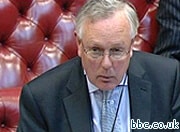One Peer’s call for House of Lords prayers to be ‘widened’ to include other faiths has been met with broad opposition.
Watch the House of Lords debate
But a number of Peers spoke out against such a move, with one saying that many in the Lords are “wholly satisfied” with the current system.
Timeless
Currently a bishop in the House of Lords conducts prayers at the start of each sitting. Attendance at the prayers is voluntary.
Speaking in the debate Labour’s Lord Anderson described them as “timeless sentiments and superlative prose”.
Conservative Peer Lord Cormack argued many in the Lords who “are not of the Christian faith, such as my noble friend who sits beside me who is a Hindu, warmly welcome the sentiments contained in the Prayers and the majesty of the language in which they are uttered”.
Offend
Lord Hughes, an honorary vice-president of the British Humanist Association, said his personal preference would be for no prayers at all.
Lord Roberts also suggested the idea of having a “minute of silence and reflection in addition to the Prayers”.
Responding to the questions, Chairman of Committees Lord Brabazon said he did not think there was “anything in the Prayers which could possibly be seen as offensive to members of other religions”.
He commented that there were “currently no plans” to alter the arrangements for prayers in the House of Lords.
Charles II
Lord Brabazon added: “My Lords, the practice of Prayers in the House is believed to have started in about 1558, and was common practice by 1567.
“The present form of Prayers probably dates from the reign of Charles II. Recent changes to the form of Prayers included allowing a choice from a range of Psalms, which was agreed by the House in 1970, and again in 1979, and one or two other minor changes.
“It might be a little premature to consider changing them now.”
End prayers
In February Jo Johnson MP said the House of Commons should stop saying prayers at the start of its proceedings.
Jo Johnson, the MP for Orpington, said: “I am not against going to church, which is something that people should feel free to do, but it is something that MPs should be encouraged to do in their own time”.
The MP is the brother of Boris, the Mayor of London. Last year the Mayor backed prayers in Parliament, saying it was helpful for both believers and non-believers.
But Jo Johnson said the prayers, at which attendance is voluntary and are held without public or press present in the Commons, should be moved from the main chamber to Westminster Hall.
Rights
Currently a secular campaign group is trying to use the courts to stop a small council from holding prayers at the start of its meetings.
Bideford Town Council, in North Devon, is said to have had prayers at its meetings since the reign of Queen Elizabeth I.
But the National Secular Society says the practice infringes the human rights of non-believers.
Aggressive
Its executive director said if council members wanted to pray before a meeting, they could but “preferably in another room”.
The Christian Institute has stepped in and offered to pay Bideford Council’s legal costs should it lose in court.
Last year Mike Judge, Head of Communications at The Christian Institute, said: “This is really a move by aggressive atheism trying to shove Christianity out of public life.”

